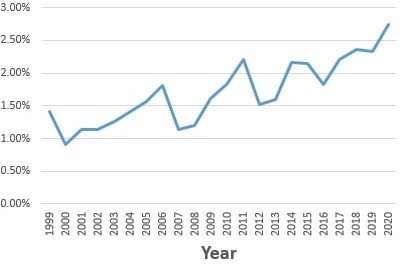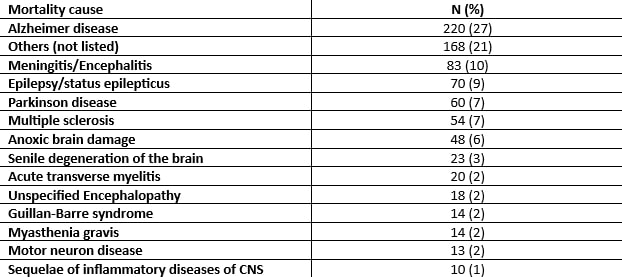Session Information
Date: Monday, November 13, 2023
Title: (1442–1487) SLE – Diagnosis, Manifestations, & Outcomes Poster II
Session Type: Poster Session B
Session Time: 9:00AM-11:00AM
Background/Purpose: SLE is a chronic autoimmune disease and affects many organ systems. Juvenile onset disease, male sex, renal involvement, and central nervous system involvement are poor prognostic factors in SLE. ACR defined some neuropsychiatric symptoms in SLE. However, their attribution to SLE is challenging due to confounding factors, especially in older populations. Atherosclerotic complications, including cardiovascular and cerebrovascular diseases, are important causes of mortality in patients with SLE. Until now, no study has evaluated nervous system mortality causes in SLE patients. This study investigated nervous system-related mortality in SLE in the past two decades in the USA.
Methods: This retrospective cohort study used the Multiple Cause of Death files maintained by the National Center for Health Statistics to investigate the direction of proportionate nervous system-related mortality in SLE, defined as the number of deaths from diseases of the nervous system (the underlying cause of death: International Classification of Diseases, version 10 [ICD10]: G00-G98), divided by the number of all-cause mortality in patients with SLE (defined in multiple causes of death: ICD10 code M32) from 1999-2020. The data set utilizes death certificate data for US residents. To analyze changes in mortality trends, we separated the study period into two decades, the first decade (1999-2009) and the last decade (2010-2020). Spearman’s correlation test was used for trend analysis, and the Chi-square test was used for comparisons.
Results: 47,337 deaths in SLE occurred during the study period. 814 (1.72%) died of nervous system causes. The mean age for nervous system-related mortality was 69.3 years. Proportionate nervous system-related mortality in SLE was higher in women than men (1.79% vs. 1.34%, p=0.0087), significantly lower in African-American SLE patients than in other races (1.27% vs. 1.93%, p< 0.00001), and lower in Hispanic SLE patients than non-Hispanic patients (1.24% vs. 1.79%, p=0.0034). Proportionate mortality from nervous system disease increased from 1.33% in the first decade (1999-2009) to 2.11% in the second decade (p< 0.00001) (Figure 1). The most common nervous system cause of death in SLE was Alzheimer’s Disease (27%). Table 1 shows other nervous system causes for mortality (Table 1).
Conclusion: This national data showed a significant increase in proportionate mortality from nervous system diseases in SLE. SLE patients in ethnic or racial minority groups seem protected from nervous system-related mortality. Prospective cohort studies are required to understand these trends.
To cite this abstract in AMA style:
Daoud A, Dweik L, Magrey M, Pamuk O. Mortality from Diseases of the Nervous System in Patients with Lupus in the past Two Decades [abstract]. Arthritis Rheumatol. 2023; 75 (suppl 9). https://acrabstracts.org/abstract/mortality-from-diseases-of-the-nervous-system-in-patients-with-lupus-in-the-past-two-decades/. Accessed .« Back to ACR Convergence 2023
ACR Meeting Abstracts - https://acrabstracts.org/abstract/mortality-from-diseases-of-the-nervous-system-in-patients-with-lupus-in-the-past-two-decades/


